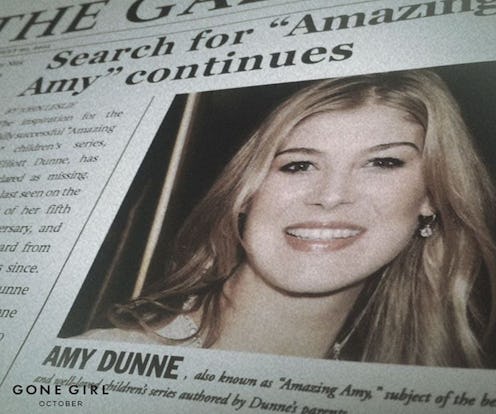Books
FBI Agent Takes 'Gone Girl' To Task

Book reviewers, movie critics, and the Academy have already had their hand at analyzing Gillian Flynn's blockbuster book and movie adaptation Gone Girl. But now FBI agent Candice Delong analyzes Gone Girl's missing person's case of Amy Dunne, calling out the fictional police department for some questionable work. Be forewarned, there are there are raging spoilers ahead, so if you're a human on this planet who has not yet read or watched Gone Girl , back away now or risk ruining the twist. Of course, this point of view on the story should in no way take away from your experience reading the book, it's just super-fun to get an expert opinion on real police work. And the bottom line is, Amy, you would have never gotten away with this BS on Delong's watch.
As you all surely remember from that shocking moment reading the book, Amy fakes her own disappearance and frames her cheating husband Nick for her murder. Amy goes to huge lengths to set up this crime, spilling her real blood, harming herself to fake abuse allegations, and, later, when he plan goes awry, having sex with her ex-boyfriend before she can kill him so she can claim rape. Basically, she's a sociopath. And the police don't suspect a thing.
According to Delong, any FBI profiler worth her salt would have suspected Amy as soon as she showed up alive. Delong immediately suspects Amy of having Munchausen syndrome, or what is also called factitious disorder (seriously). The Mayo Clinic says this about factitious disorder:
Factitious disorder is a serious mental disorder in which someone deceives others by appearing sick, by purposely getting sick, or by self-injury. Factitious disorder symptoms can range from mild (slight exaggeration of symptoms) to severe (previously called Munchausen syndrome). The person may make up symptoms or even tamper with medical tests to convince others that treatment, such as high-risk surgery, is needed.
Often these actions are a result of needing constant attention, Delong says. The FBI agent points to Amy's string of behavior after "escaping" Desi as indicative of the disorder — not calling the police, showing up still covered in his blood — something police should have picked up on.
"I've seen people at their worst. I know how people react after a traumatic experience," Delong said. "And Amy Dunne, after supposedly being raped and tortured, acted in ways an FBI profiler would have found suspicious right off the bat."
A normal victim would not and could not wait, Delong said. She would be screaming to get the blood off of her. This behavior should have tipped off police to bring her in for more questioning, which Delong said would have revealed further problems wtih her story. You know, the whole: If you were tied up, how exactly did you get a box cutter? From there, the entire missing person's case would have unraveled and Amy would likely be in prison, or a psych ward.
But hey. The ending is much creepier Flynn's way, isn't it?
Image: Gone Girl/Facebook; Giphy